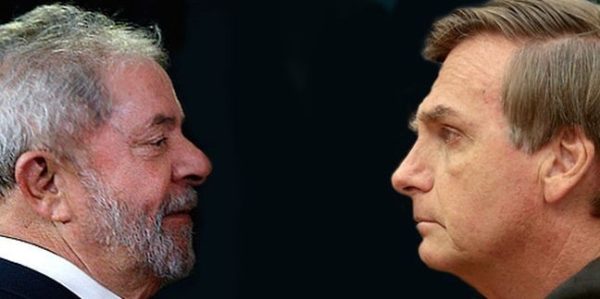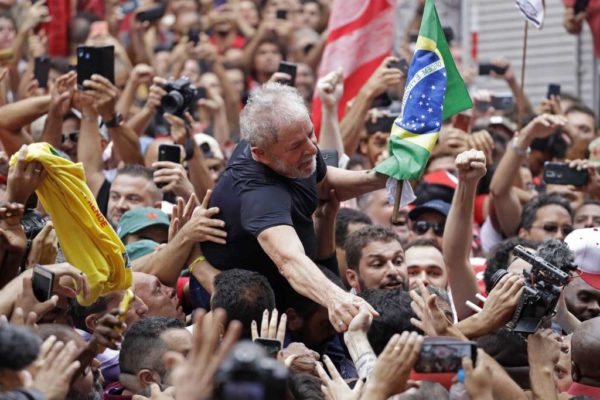 By Ishaan Tharoor
By Ishaan Tharoor
“They did not jail a man,” declared the released prisoner. “They tried to kill an idea, and ideas don’t disappear.”
The freed man was Luiz Inácio Lula da Silva, the former left-wing Brazilian president who was jailed last year on corruption charges that his supporters believe were politically motivated. Lula left office in 2010 with a staggering 80 percent approval rating and was favored to be on course to return to power in 2018; his imprisonment paved the path to the presidency for far-right firebrand Jair Bolsonaro, who, both on the campaign trail and now in office, has loudly banged the drum against perceived perfidy and tyranny of leftist dogma.
But last week, Brazil’s Supreme Court ruled that Lula, as well dozens of others ensnared in a rolling corruption probe that reshaped Brazilian politics, had been unjustly jailed without receiving due process – that is, they had been denied the ability to exhaust their right to appeal their sentences before imprisonment. On Friday, Lula walked out of jail and was greeted by a throng of supporters from his left-leaning Workers’ Party.
“You have no idea of the meaning of me being here with you,” he said soon after his release in the southern city of Curitiba. “I, who have been speaking to the Brazilian people through all my life, did not think that I would be able to speak today . . . Every day you were the democracy’s fuel I needed to exist.”
From thousands of miles to the north came a striking message of support. Democratic presidential candidate Sen. Bernie Sanders, I-Vt., tweeted his admiration for Lula’s socially minded policies and decried his imprisonment. “I am delighted that he has been released from jail, something that never should have happened in the first place,” Sanders said. Lula thanked the U.S. candidate for his “solidarity,” and expressed his “hope” that the Democrats “have the wisdom to nominate a candidate with your worldview.”
The stage is set for an emboldened and aggrieved Lula to take the fight to Bolsonaro, who has courted President Donald Trump as part of a new hemispheric right-wing axis. “If we work hard, in 2022 the so-called left that Bolsonaro is so afraid of will defeat the ultraright,” Lula declared in a 45-minute speech he gave Saturday, vowing to build a new coalition to take down Bolsonaro.

(AP Foto/Nelson Antoine)
Even before his release, he cast his struggle in more global terms. In a letter addressed to Britain’s Labour Party that he wrote from prison earlier this year, Lula inveighed against the “austerity” championed by Bolsonaro’s administration, what he deemed “the magic and wretched word that the rich everywhere use to attack the rights and achievements of the working class.” He went on: “‘We need to save resources, cut costs,’ they say, as they disassemble the state and become ever richer while the poor become ever poorer. So it is in the United Kingdom, so it is once again in Brazil.”
Bolsonaro has anchored his politics in a rejection of years of left-wing rule, unraveling environmental protections, seeking to privatize state institutions, and dabbling in an angry culture war targeting indigenous and LGBT rights. After Lula’s release, he heaped scorn on his leftist adversary. “Let’s not give space to compromise with a convict,” Bolsonaro told supporters in Brasilia. “Do not give ammunition to the scoundrel, who is momentarily free but full of guilt.”
Indeed, there’s plenty Lula still has to overcome. “The legal path ahead of Lula, Brazil’s first working-class president, remains treacherous,” wrote my colleague Terrence McCoy and Heloisa Traiano. “He faces eight other trials on charges of corruption and money laundering. In 2016, as part of the Operation Car Wash investigation, Lula was accused of peddling government influence for renovations to his beachfront property.”
Lula was hardly the only official caught up in the dragnet of Operation Car Wash, which implicated others in his own party as well as numerous politicians in factions further to the right in various cases of alleged bribery, graft, and kickbacks for state contracts. His defenders question the specific charges against him and the evidence upon which they are based. Now‚ the country’s byzantine appellate process may mean the proceedings against Lula drag on in the background for many months to come as he works freely to mobilize the Brazilian opposition.
Recent revelations about the apparent secret collaboration between the prosecutors and the chief judge in charge of Operation Car Wash – who now also happens to be Bolsonaro’s justice minister – have further sharpened the impression that Lula was rushed into prison and then barred from running for office to prevent his return to power. The politicization of Lula’s travails has also been brought into stark relief by the myriad controversies spiraling around Bolsonaro, including a troubling new report linking his family to the assassination of a socialist politician in Rio de Janeiro.
Some Brazilian commentators observed this weekend that the former president is emerging from his time in prison a more galvanized and possibly more radical figure, inflamed by a desire to roll back the far-right advance in his country. In his time in office between 2003 and 2010, Lula invested heavily in a slate of social programs that brought millions of people into the Brazilian middle class, a legacy that underscores his vast popularity to this day. Lula’s life story is that of a populist folk hero: He grew up in deep poverty, only learned to read at the age of 10, worked as a factory laborer and, as a union organizer, was hounded and briefly jailed by the country’s military dictatorship – the same junta routinely celebrated by Bolsonaro and his allies.
Latin America has a tangled, sprawling history of left-wing politics clashing against more reactionary forces. Just this weekend in Bolivia, mass protests and then an army and police insurrection compelled long-ruling President Evo Morales to give up a controversial bid to extend his rule. Lula, widely described when in power as a “moderate” leftist, presents an altogether different figure.
He “is the rare politician whose fate concerns a global audience,” wrote Andre Pagliarini, a historian of Latin American politics, pointing to Lula’s record of achieving both social uplift and economic prosperity. Pagliarini added: “It requires no stretch of the imagination . . . to imagine Lula as a bulwark against the reactionary right’s further advance in Brazil and Latin America more broadly.”
THE GREENWICH TIME

Leave a Reply
You must be logged in to post a comment.